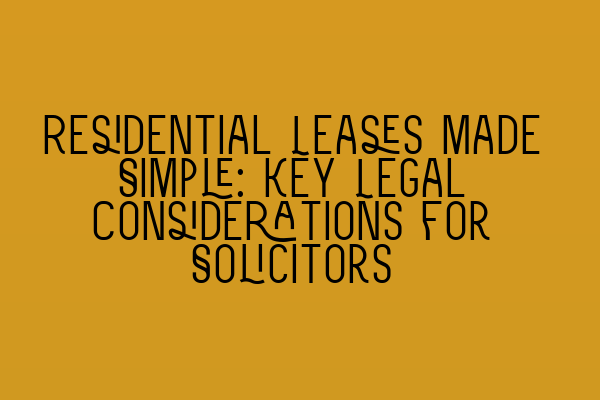Residential Leases Made Simple: Key Legal Considerations for Solicitors
As a solicitor specializing in property law, it’s crucial to have a solid understanding of residential leases. Whether you are advising landlords, tenants, or managing agents, having a comprehensive knowledge of the key legal considerations surrounding residential leases is essential to ensure your clients’ interests are protected.
In this article, we will explore some of the important legal aspects of residential leases that every solicitor should be well-versed in. We will discuss the key terms and clauses to include in a residential lease, as well as the rights and responsibilities of both landlords and tenants. So, let’s delve into the intricacies of residential leases and arm you with the information you need to navigate this area of property law.
Key Terms and Clauses in Residential Leases
When drafting or reviewing a residential lease, there are several key terms and clauses that need careful consideration. These terms and clauses will dictate the rights and obligations of both parties involved in the lease. Here are a few essential ones to keep in mind:
- Rent and Payment Terms: The lease should clearly define the amount of rent, when it is due, and any penalties for late payment. It is also crucial to outline the procedure for rent increases and the frequency of such increases.
- Term and Renewal: The lease should specify the length of the tenancy, whether it is a fixed or periodic term, and the procedure for renewal. Including a termination clause is also important to outline under what circumstances the lease can be terminated.
- Repairs and Maintenance: Clarifying the responsibilities for repairs and maintenance is essential to avoid disputes. The lease should clearly state who is responsible for specific repairs and maintenance, such as the landlord for structural issues and the tenant for minor repairs.
- Use and Restrictions: The lease should outline how the property can be used and any restrictions imposed by the landlord. For example, some leases may prohibit subletting or certain types of business activities.
- Deposit: The lease should provide details on the amount and handling of the security deposit, including the conditions for its return at the end of the tenancy.
- Utilities and Services: It’s important to specify who is responsible for paying utility bills and other services (e.g., water, electricity, internet) and how these payments will be apportioned if there are multiple units in the building.
These are just a few key terms and clauses to consider when drafting or reviewing a residential lease. It’s crucial to tailor the lease to the specific needs of your client, incorporating any additional provisions or clauses that may be necessary.
Rights and Responsibilities of Landlords and Tenants
Understanding the rights and responsibilities of both landlords and tenants is fundamental to providing sound legal advice. Here are some essential points to consider:
- Landlords’ Rights and Responsibilities: Landlords have the right to collect rent, maintain the property, and carry out repairs. They also have the right to access the property for inspections and repairs, provided they give reasonable notice to the tenant. Landlords are responsible for ensuring the property complies with relevant health and safety regulations.
- Tenants’ Rights and Responsibilities: Tenants have the right to quiet enjoyment of the property and expect basic amenities to be in working order. They are responsible for paying rent on time, keeping the property clean, and respecting the terms of the lease. Tenants also have the right to challenge unfair evictions and request repairs from the landlord.
- Dispute Resolution: It’s important to advise your clients on the available methods of dispute resolution, such as negotiation, mediation, or pursuing legal action through the courts if necessary. Exploring alternative dispute resolution methods can help save time and costs for both parties involved.
By educating yourself and your clients on the rights and responsibilities of landlords and tenants, you can help ensure a harmonious landlord-tenant relationship and prevent potential legal disputes.
Conclusion
Residential leases can be complex, but with a solid grasp of the key legal considerations, you can confidently navigate this area of property law. By carefully drafting or reviewing residential leases, including the essential terms and clauses, and advising your clients on their rights and responsibilities, you can provide invaluable legal support and protect their interests.
If you found this article helpful, you may also be interested in reading these related articles:
- 48. Unlocking Legal Research Skills for SQE Success
- 53. Functioning Legal Knowledge (FLK): Core Concepts for SQE Candidates
- 44. Essential SQE Textbooks: Building a Solid Foundation for Exam Prep
- 43. Unraveling the SQE Stages: A Roadmap to Success
- 41. Test Centers for SQE: Convenient Locations for the Exam
